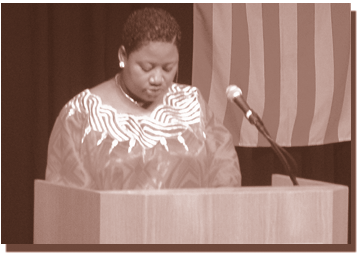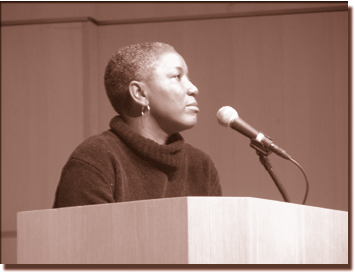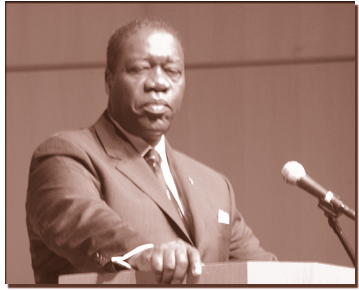
An Old Question Revisited: Is ULAA Relevant?
By Theodore T. Hodge
Thodge@theperspective.org
The Perspective
Atlanta, Georgia
March 4, 2004
 |
|
Mrs. Roberta Davies-Rashid
|
By the time our conversation was over, I was well acquainted with the president's stance on issues involving ULAA and the Liberian people at large. I was grateful for the impromptu audience the ULAA chief granted me.
 |
|
Vivienne Wreh
|
The president told me forcefully and passionately how she argued to make the case that ULAA is relevant – she seemed quite bemused that a man in such an influential position in the national political hierarchy would make such an irresponsible remark. I agreed with her that some of these so-called advisors are wrapped up deeply in a third-world mentality; that although they openly declare and claim to embrace democracy, their actions can be contradictory. I encouraged her to make the case publicly when she had an opportunity to do so. (It must be noted here that making the public case was her idea, in the first place, I only gave her a nod of confidence).
The very next day, Saturday, February 7, at the College of Staten Island, NY, where a town hall meeting was being held - featuring the NTGL Chairman Gyude Bryant – I had the opportunity to listen to the president make a public speech. Again, I was quite impressed; her delivery was strong, her style elegant and forceful and the substance of her speech apparent.
 |
|
Gyude Bryant
|
Given what the chairman said, we must be realistic to presume that he said what was expected of him in that particular setting and given the nature of the discussion. Would anyone have expected to hear a contrary viewpoint expressed by the chairman? That would have been unusual. So we are left with the same old debate: Is ULAA relevant? If so, why? And if not, why not? It is obvious Liberians have posed these questions and wrestled with them for years.
I have addressed this issue in the past. The Following two paragraphs come from a piece I did before the Akosombo conference, when I published an article under the title, "ULAA: The Conflict Within". I felt then, and still do now, that ULAA is responsible for the negative image the Liberian public holds about the organization. Writing then, I said:
"As all eyes are fixed on Akosombo, where interested parties and stakeholders will meet soon to attempt to resolve the issues affecting Liberia, a new crisis is brewing right here among us. Our premier Liberian organization, ULAA, is slowly following the ugly example of the homeland; it is headed down a path of self-destruction.
"Bitter factional rivalry within the rank and file of the organization has created an impasse. Normal activities usually undertaken by the administration have virtually grounded to a halt. However, as if in self-denial, nobody seems to want to admit it. Talking to the powers that be, everyone is quick to assure you that all is well. The truth of the matter is that all is far from well."
As many well know, a deep conflict developed in the hierarchy of ULAA, specifically, between the presidency and the board of directors. The Chairman of the Board, Mr. Ranney B. Jackson, Sr. was deposed for acts deemed unconstitutional. However, President Mr. Mohamed S. Kromah supported the board chair, urging a compromise. The issue at hand was the constitutionality of the removal of the chairman and his subsequent replacement. ULAA washed its soiled linen in public as it split along factional lines. Yes, debates and public outcries can be healthy in a pluralistic setting. But they must be contained "in-house" and all efforts must be made to use applicable conflict resolution methods to resolve them properly. In the case of the ULAA conflict, all commonsense went flying out the window as the factional infighting led to complete mismanagement and chaos.
The Liberian community was pestered with a variety of communiqués, coming from one source or another. One moment, Mr. Jackson would post a directive urging his faction on the board to resist the undemocratic attempt to dethrone him, the next moment, Hon. Ijoma Flemister would issue another communiqué stating effectively that Mr. Jackson was already out; that he, Flemister, was now the new Chairman of the Board. Meanwhile Mr. Kromah, the president, urged restraint repeatedly calling for a peaceful resolution. It was easy to conclude that the conflict easily reached unprecedented levels of incivility as Mr. Kromah was depicted as an incompetent leader and Jackson his stooge.
What was most disheartening and self-destructive was the public manner in which the organization chose to deal with the matter. It seemed that the various actors were determined to abuse the established custom of maintaining perfect decorum. In the end it was agreed that Mr. Jackson would be allowed to serve as board chairman until special elections were held. What seemed to be a small victory for Mr. Jackson turned out to be a crushing blow for his nemesis, Hon. Ijoma Flemister.
By the time the board met to have the so-called special elections, both the President, Mr. Mohamed S. Kromah and the Chairman of the Board, Mr. Ranney B. Jackson, Sr. had politely resigned their positions in the union to accept appointments in the new interim government of Liberia. (I must hasten to add that the conditions under which these gentlemen made the transition created some controversy; but that's another story).
The special elections had some surprising results: Ijoma Flemister, the Vice Chairman of the Board who was the apparent shoo-in after Mr. Jackson's anticipated demise, turned out to be the most tragic victim of this hostile maneuver: He lost the election to Mr. Anthony Kesselly, until then the most bitter and open critic of both the out-going president and chairman of the board. How Mr. Kesselly, the board member from Pennsylvania, managed to out-maneuver Mr. Flemister is still a matter of surprise to many, including myself.
Here is where I come back to the issue of relevance and the pertinent questions. I am of the opinion that ULAA is highly relevant as an umbrella organization for Liberians. But the loss of goodwill suffered by the organization is mainly self-imposed. It is apparent that the vicious acts of attacks led by ULAA insiders and office holders against their colleagues led the public to discount or dismiss the organization's relevance. By being publicly bitter and antagonistic towards each other sent the message that these "leaders" were only interested in grabbing a piece of the proverbial pie for themselves.
Speaking to Marylanders at a recent conference held in Rhode Island, Hon. J. Rudolph Johnson, Former Foreign Minister of Liberia had this to say: "...the way that little disputes are handled makes all the difference in the world - and says everything about our capacity and about who we are. We must remain highly disciplined and resist every temptation to expose or to ridicule our own "country devil", if we expect others to fear it. Let us respect those we have chosen as our leaders by remembering the golden rule - not only Robert's Rule".
The present Chairman of the Board, Mr. Anthony Kesselly was one of the most aggressive and uncompromising critics of the departed officials. Most of his attacks were personal and vicious, and most sadly, public. Did this continuous barrage of criticisms leveled against these individuals help to undermine the institution as a whole? I think so. Now that Mr. Kesselly is the new "country devil" in town, does he expect all to fear him or will the ridicule to which he exposed Messrs Kromah and Jackson come back to haunt him and have a lasting negative effect on the office he now occupies? I think so.
Yes, ULAA is relevant. But it is up to the organization to convince the public of this not just by simple utterances, but also by substance. How Chairman Kesselly and President Roberta Davis-Rashid interact with each other and how they collaborate to embark on new and substantive approaches will go a long way to repair the damaged image so far. So, to the ULAA crew I say, although you are relevant, "heal thyself".

